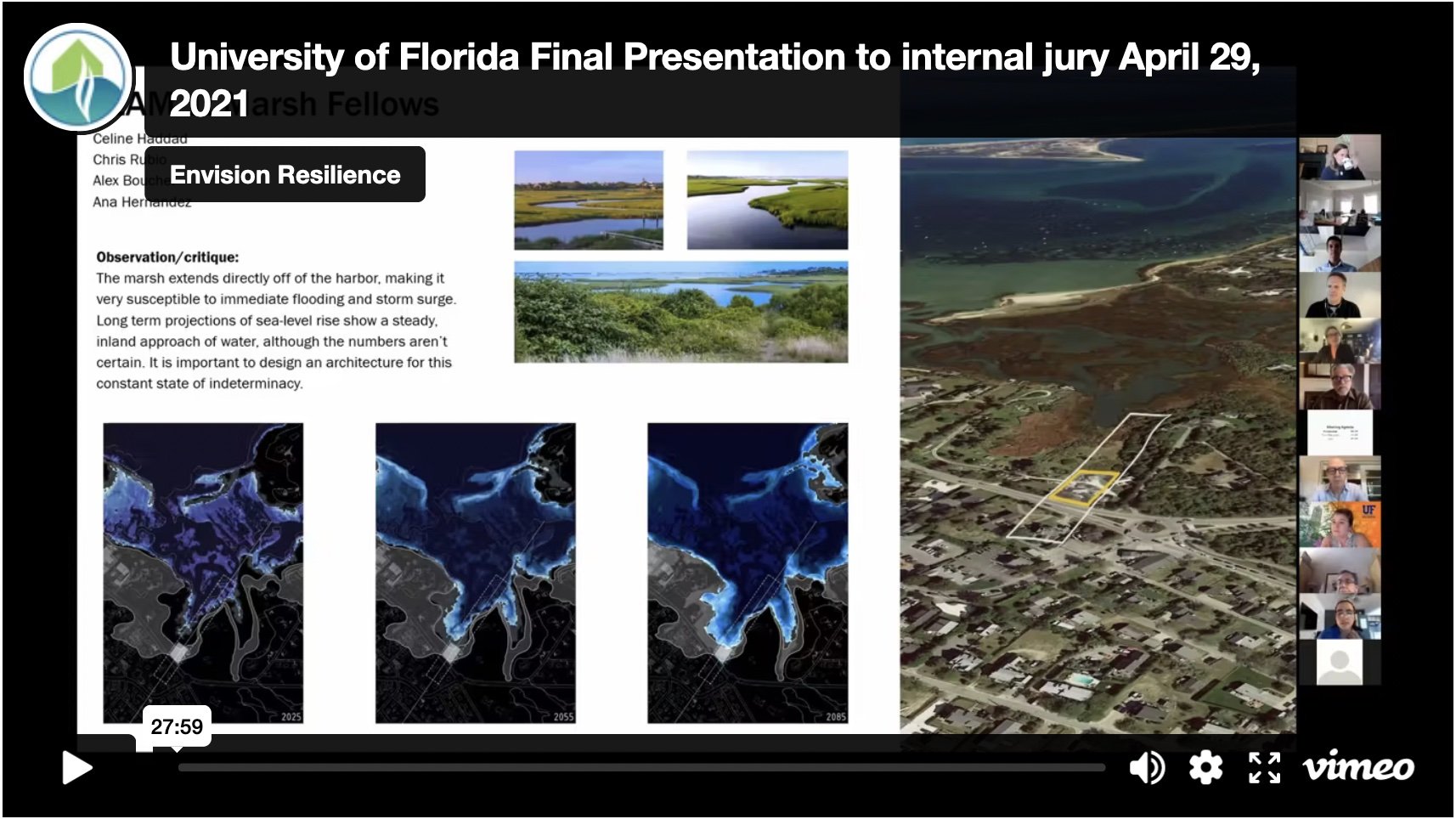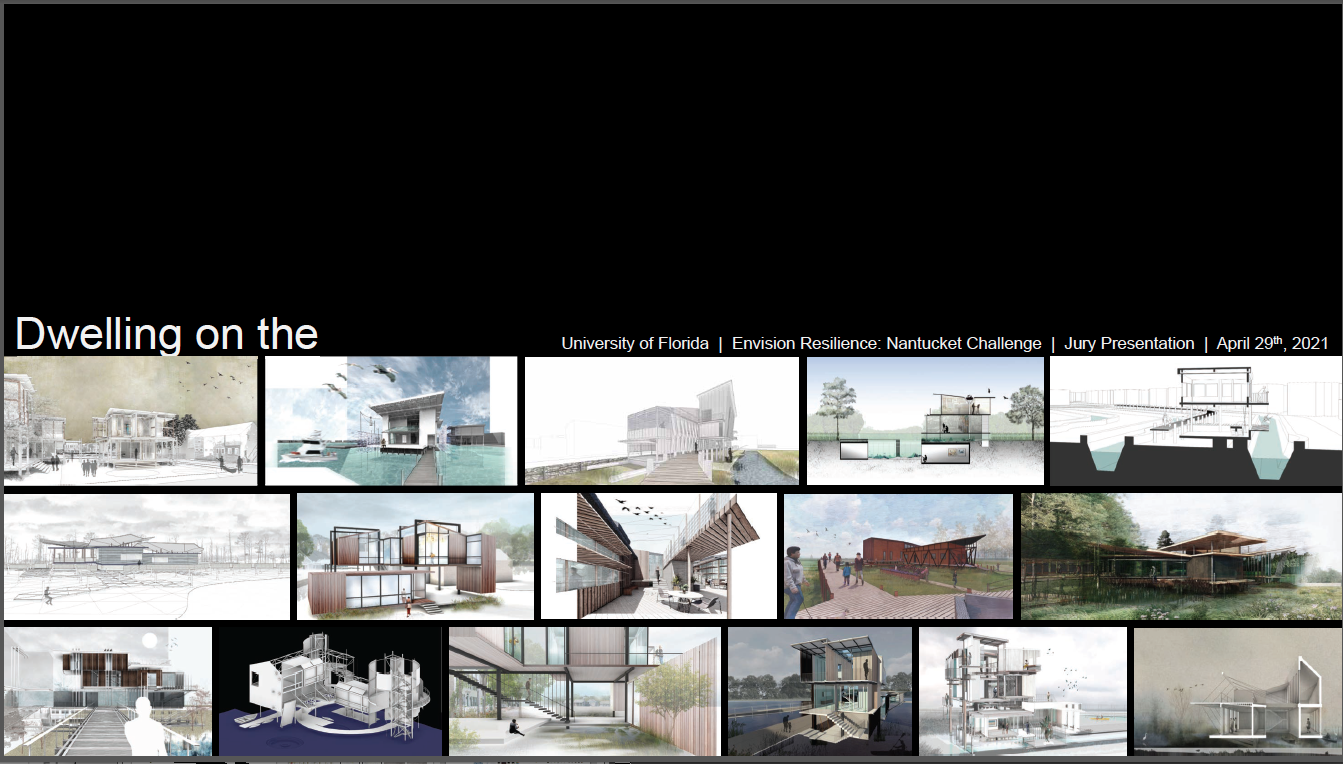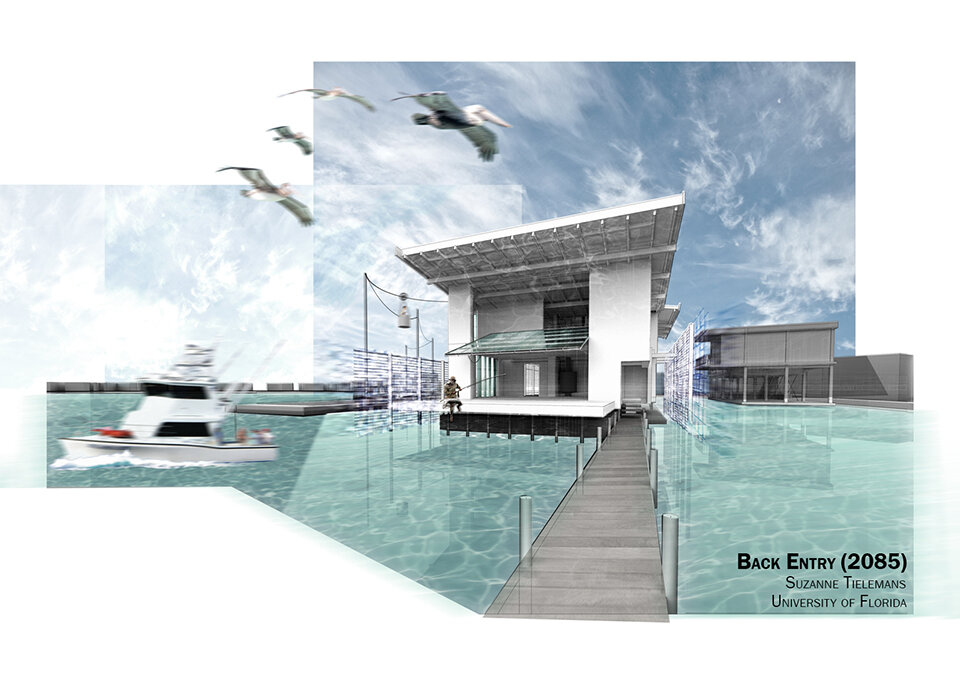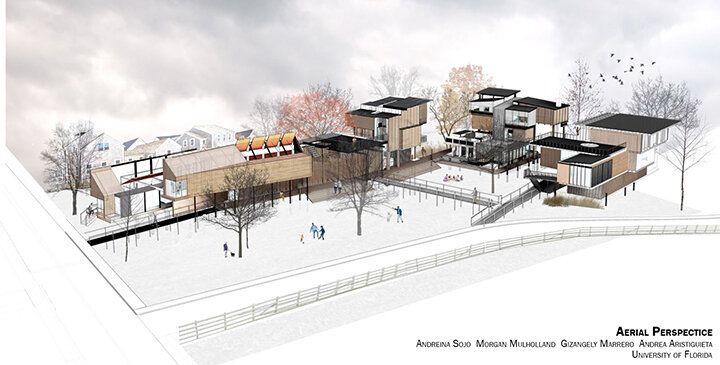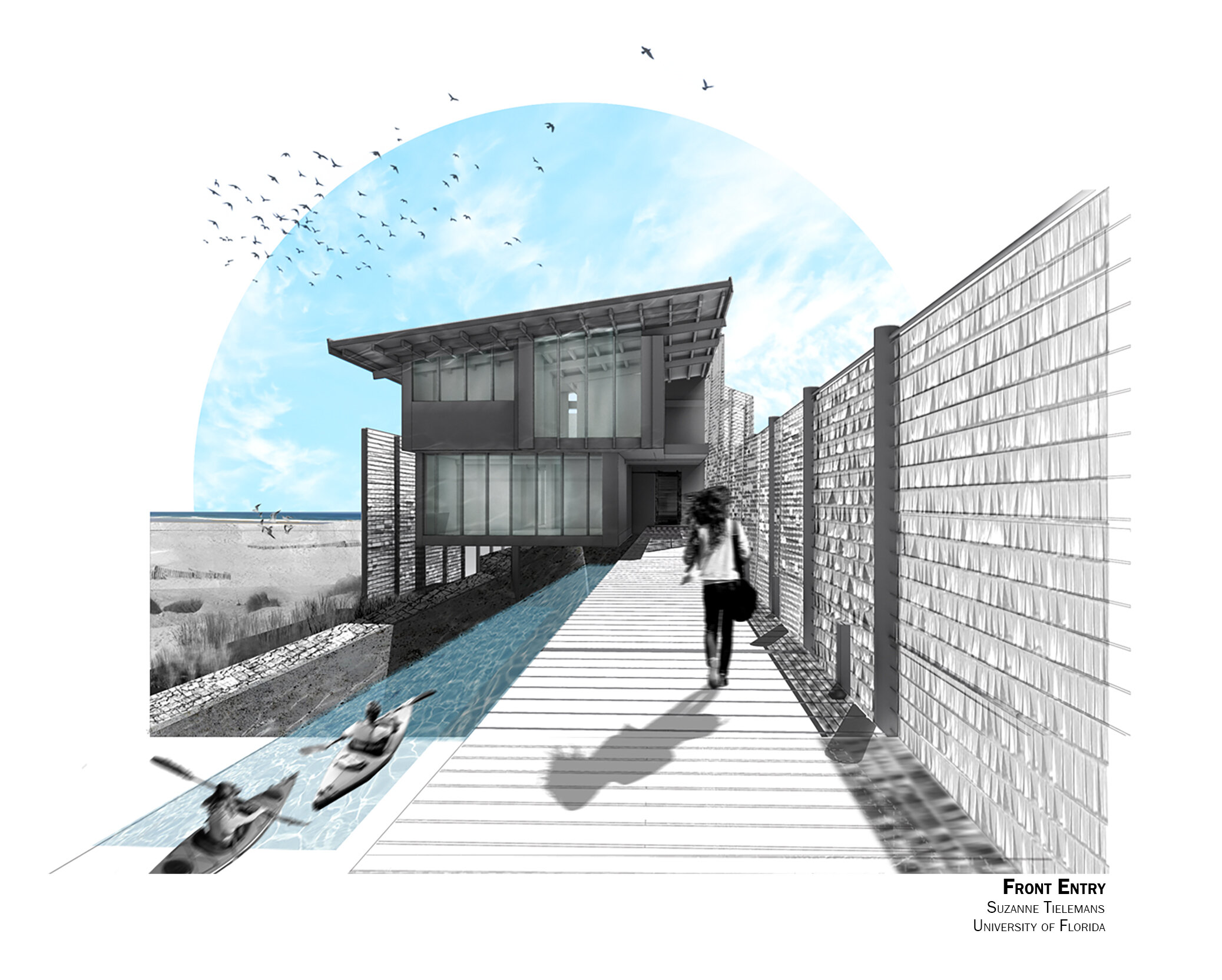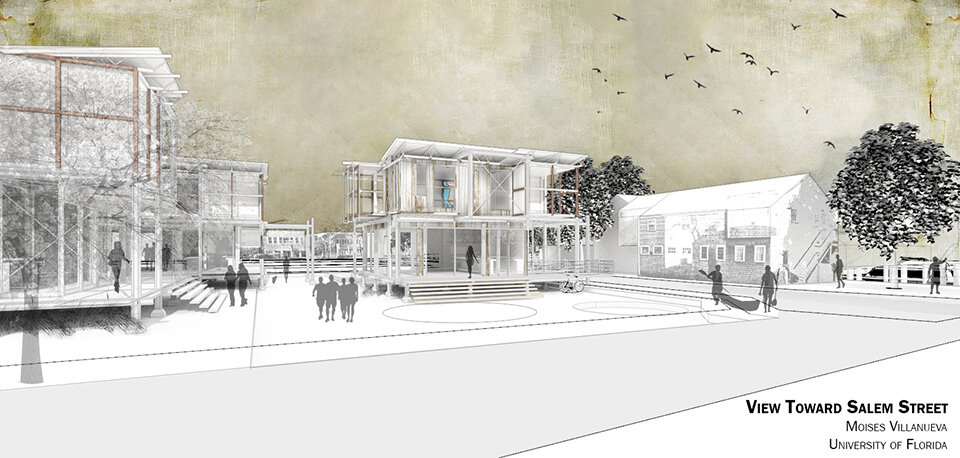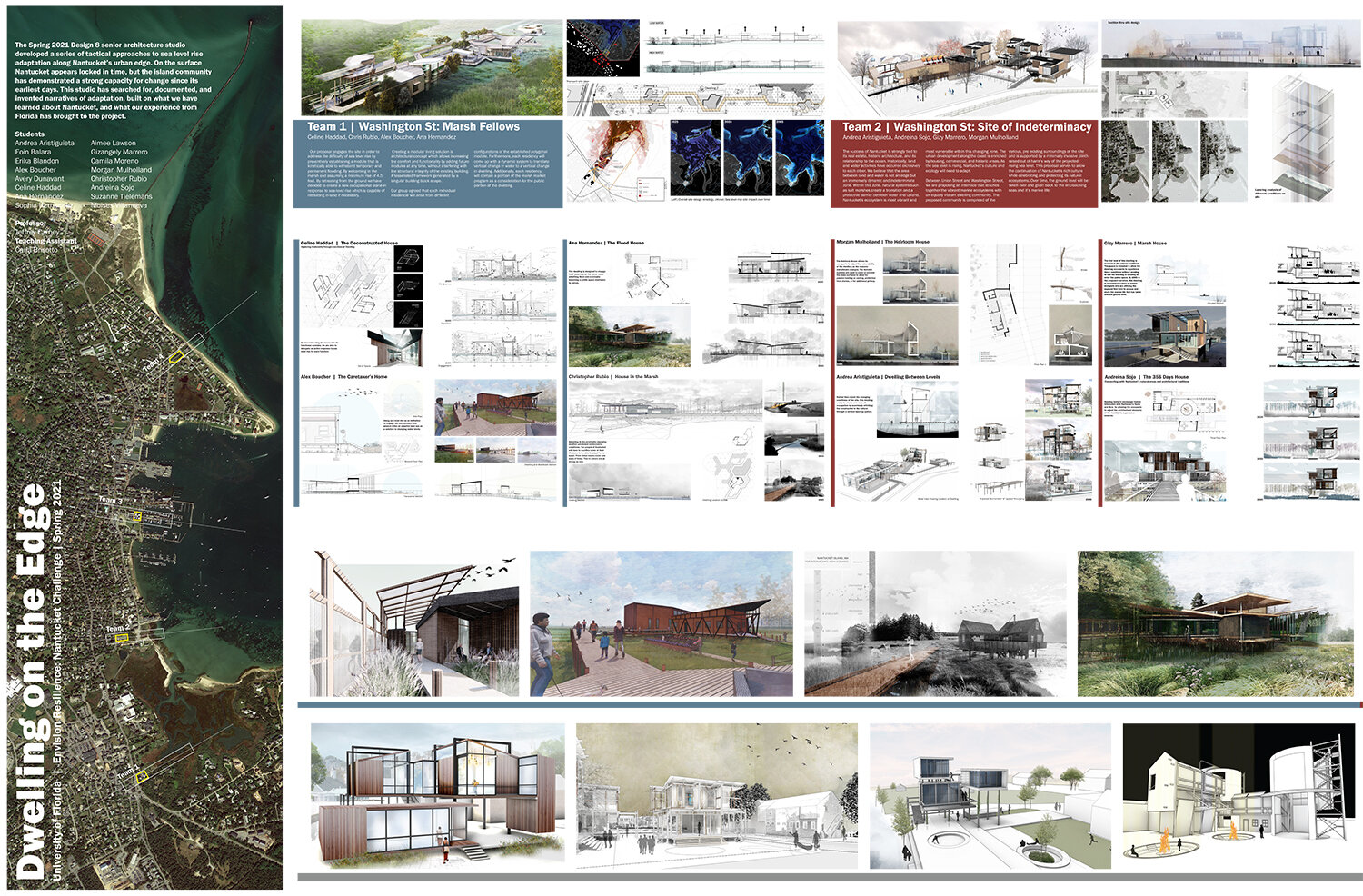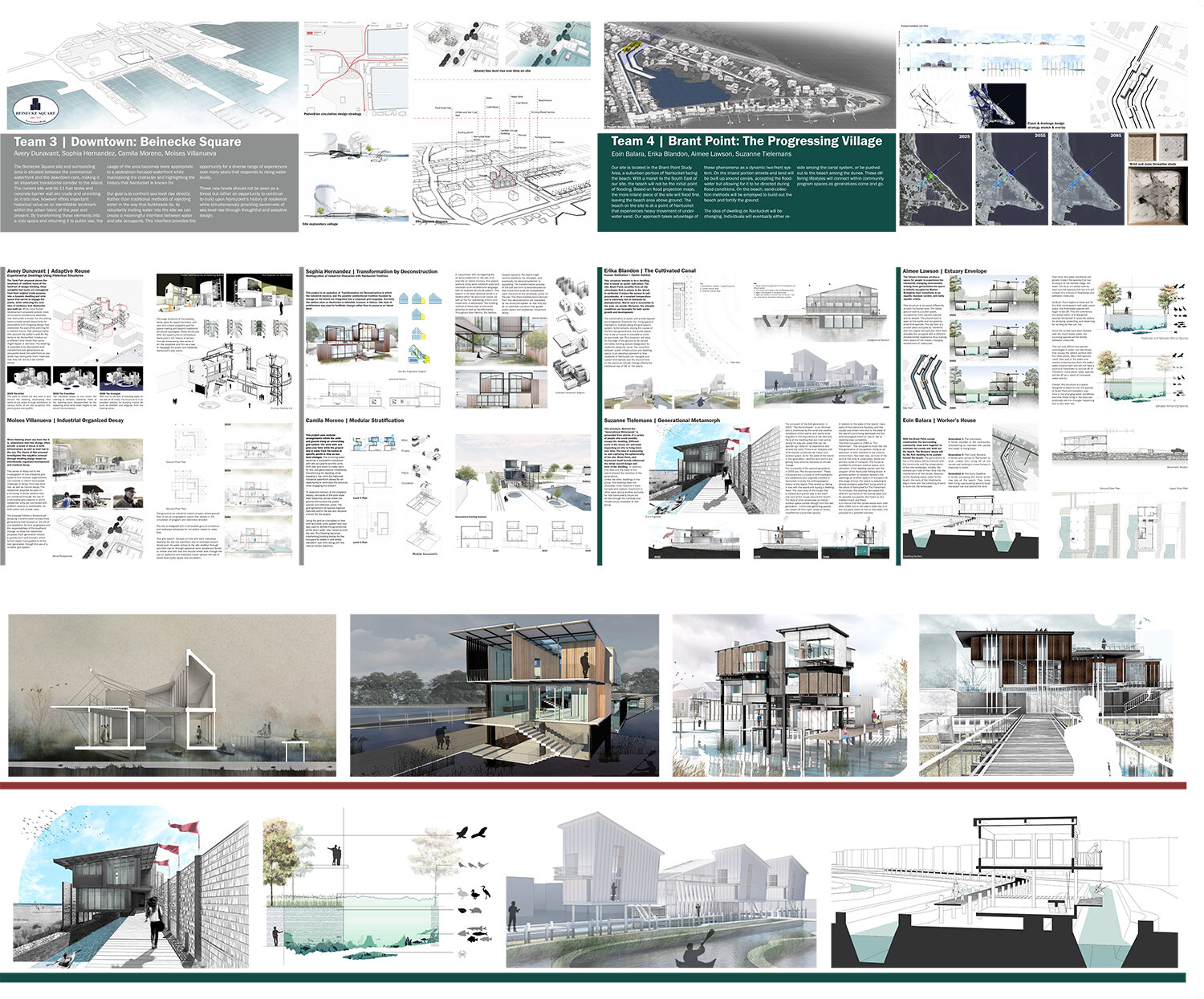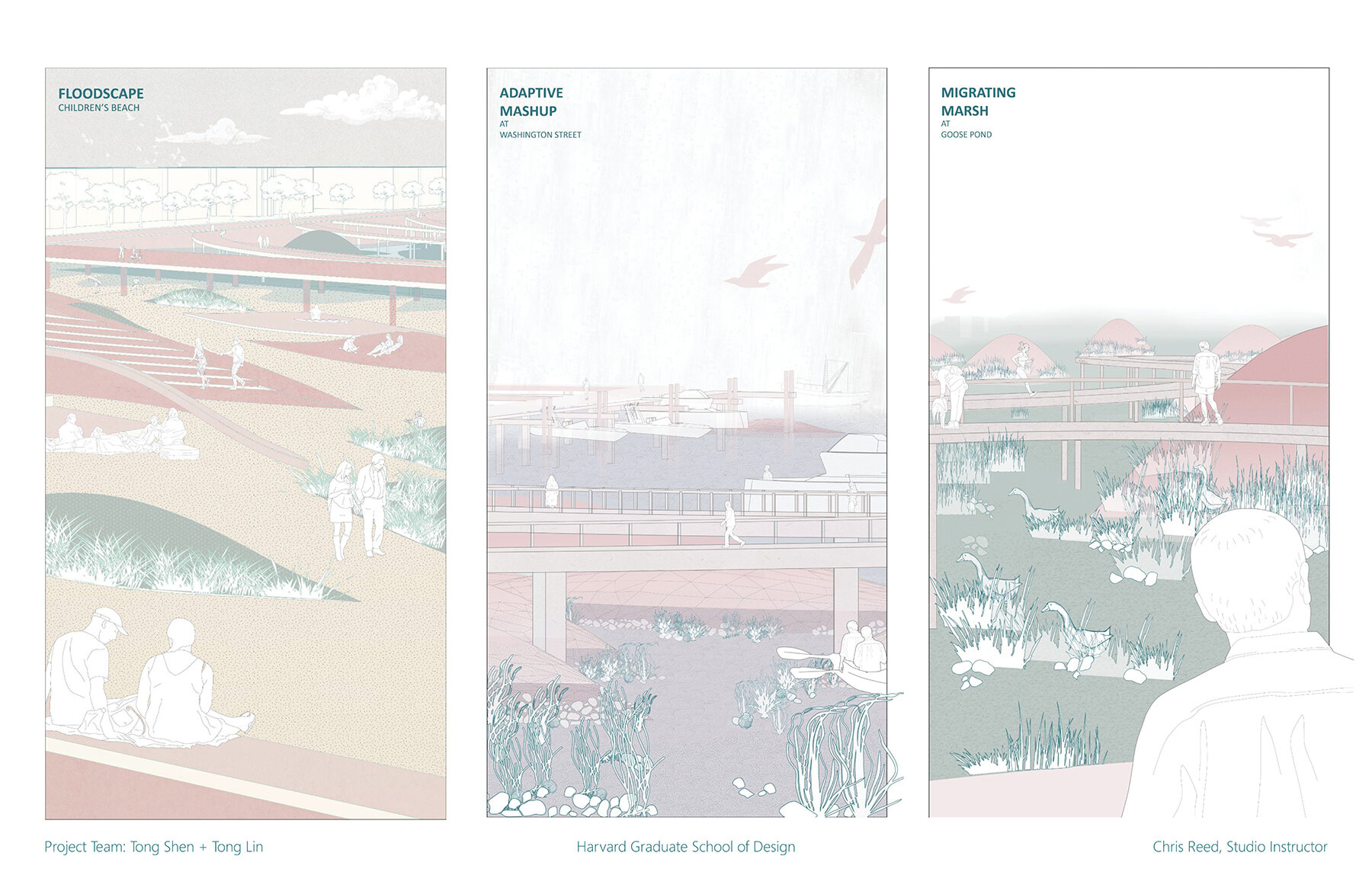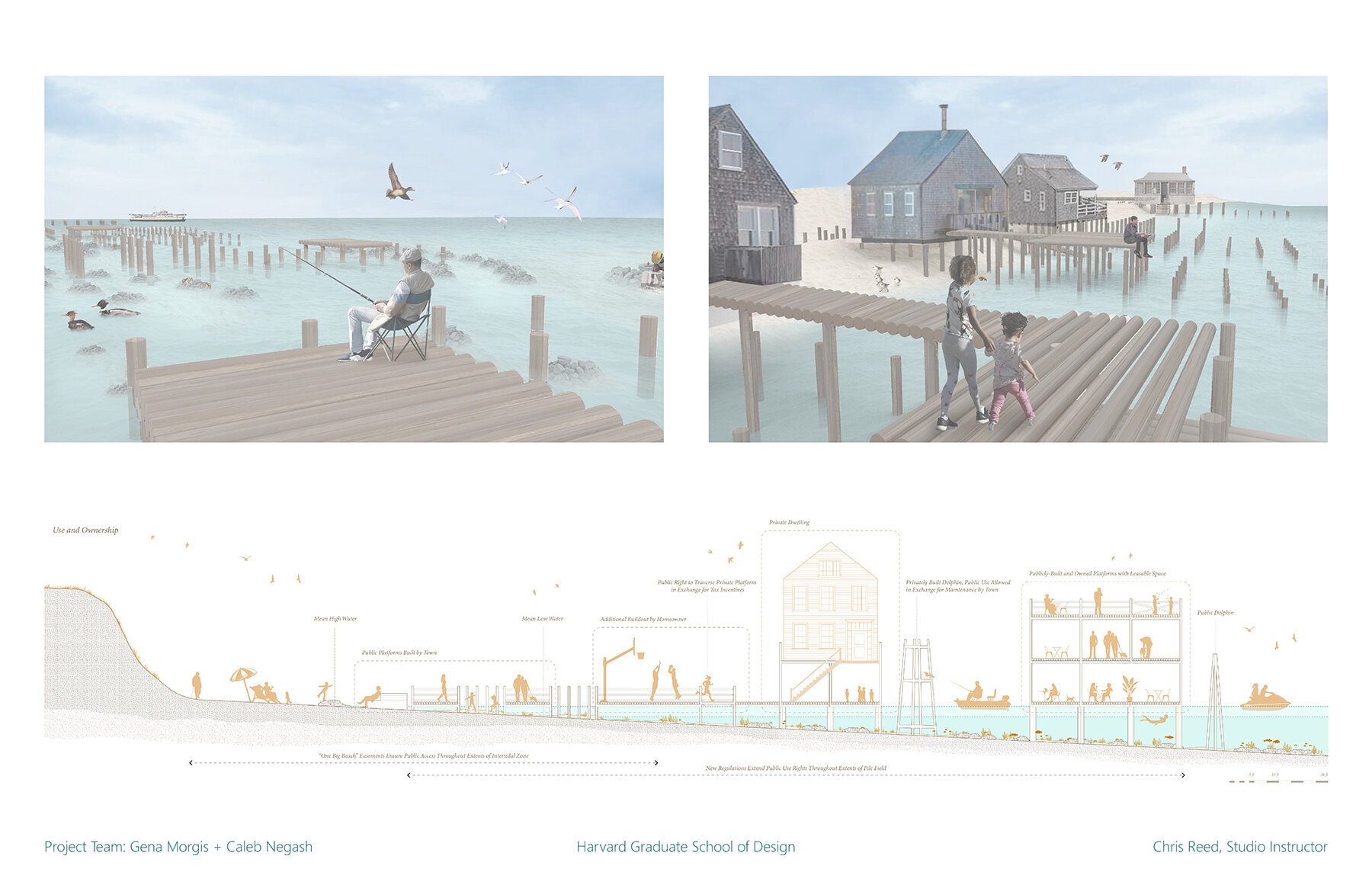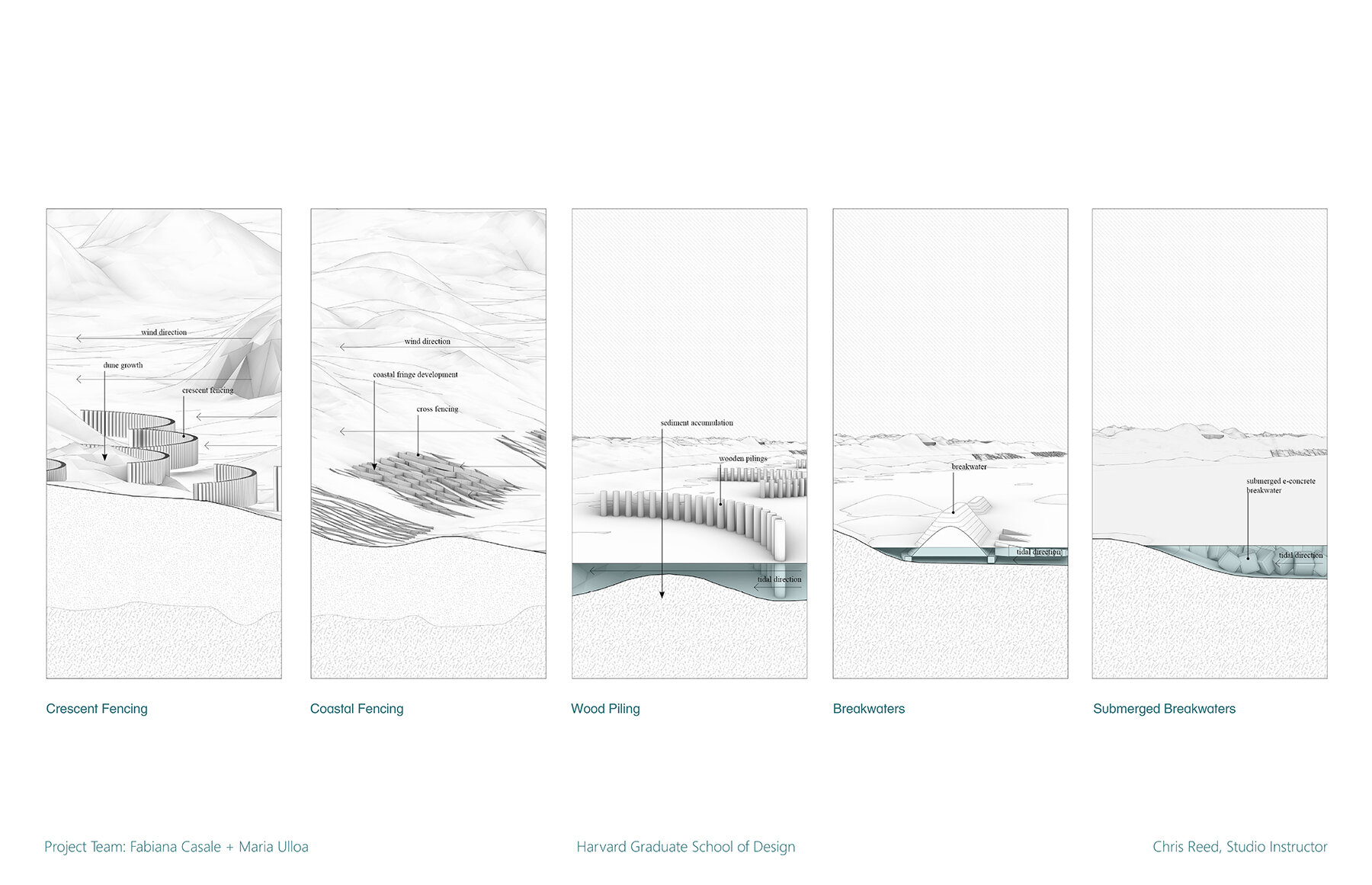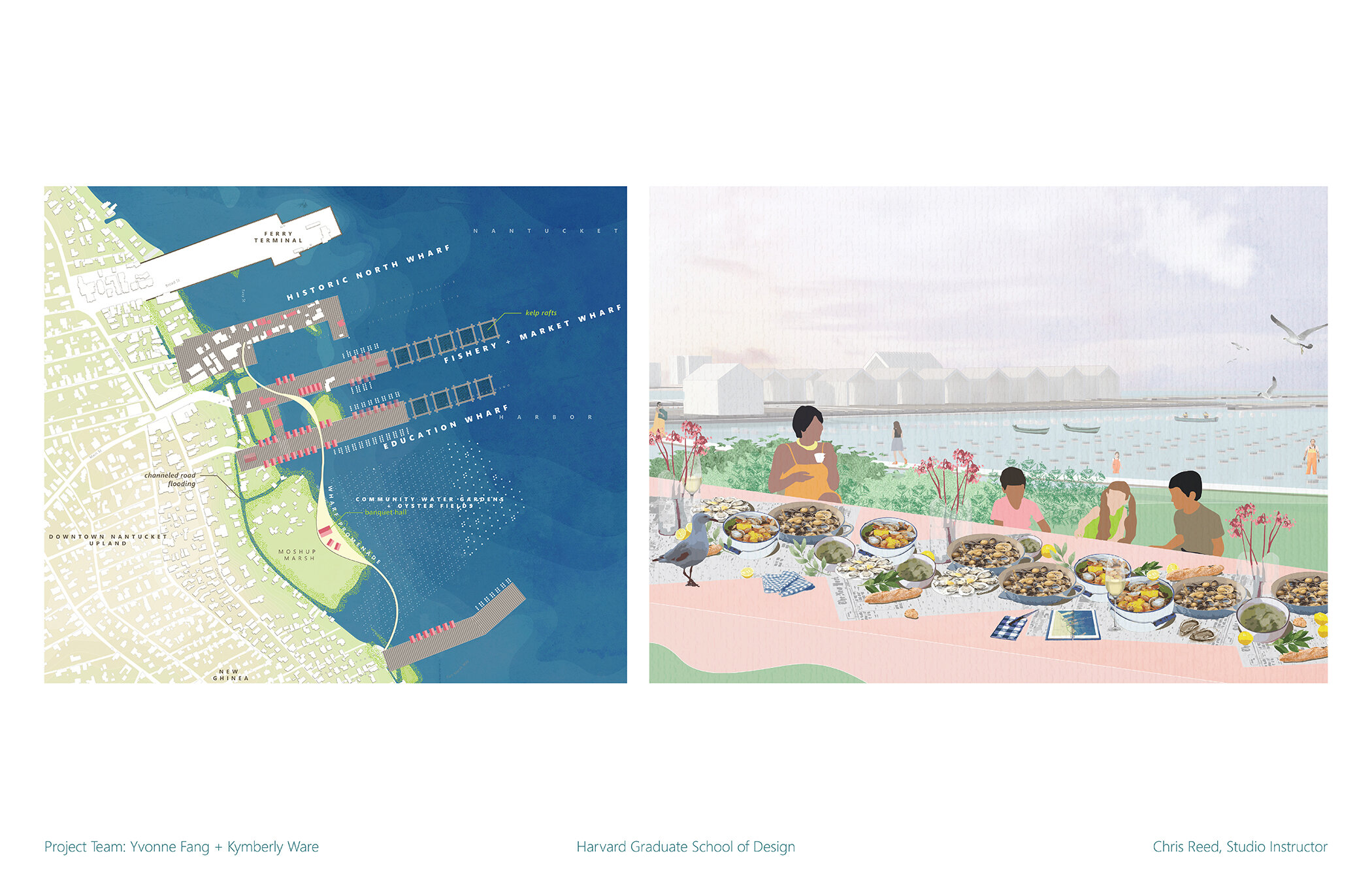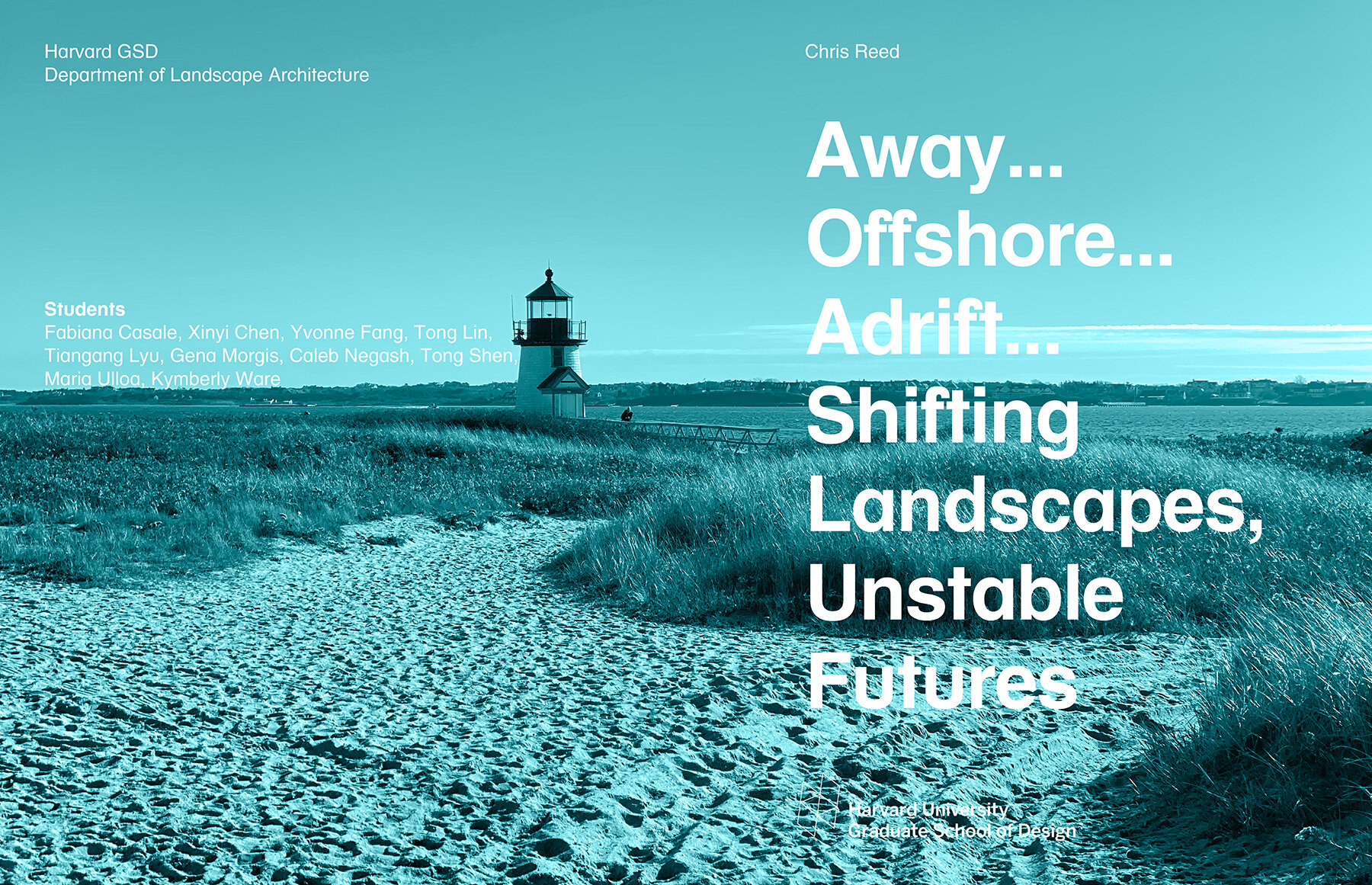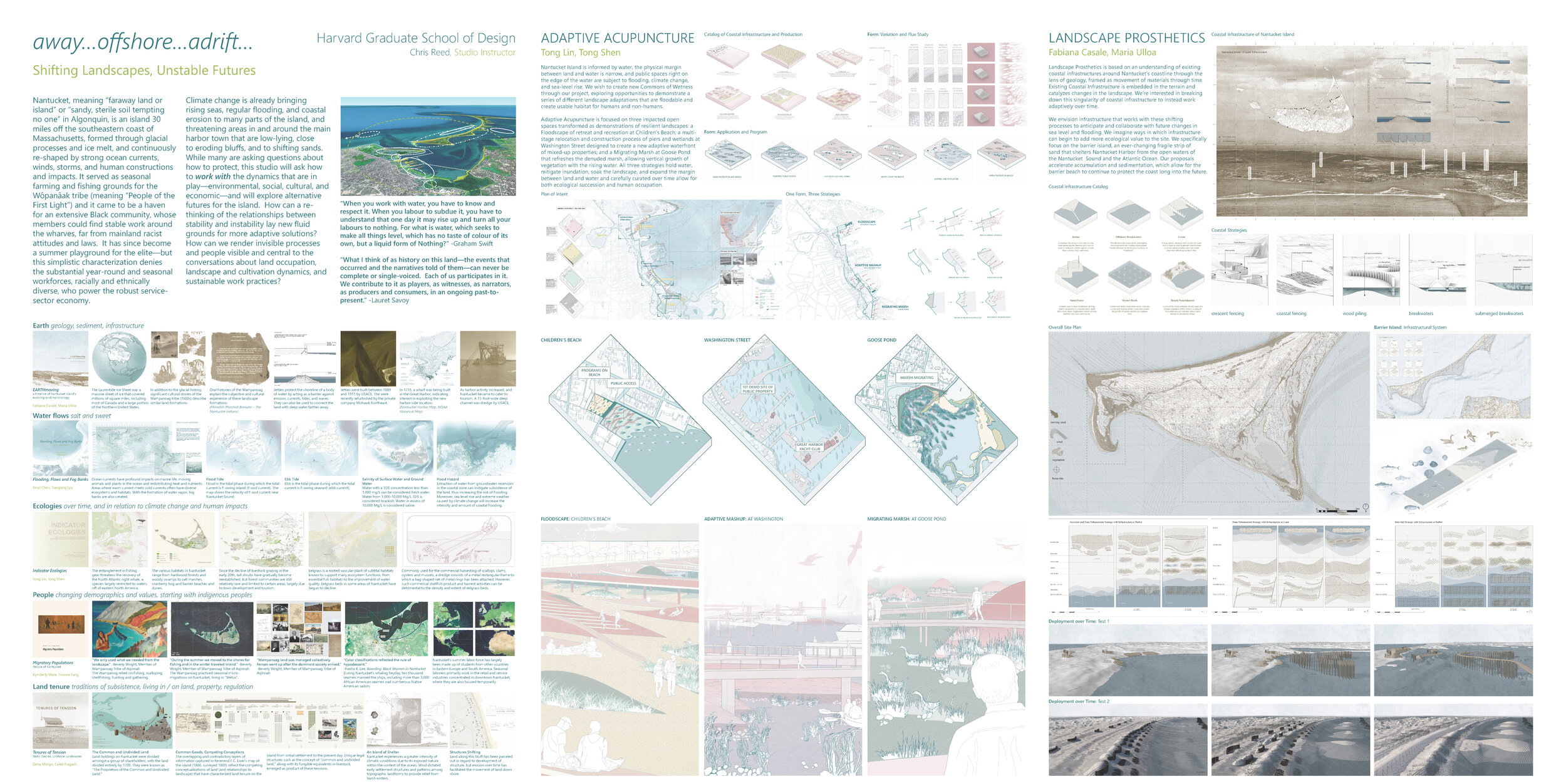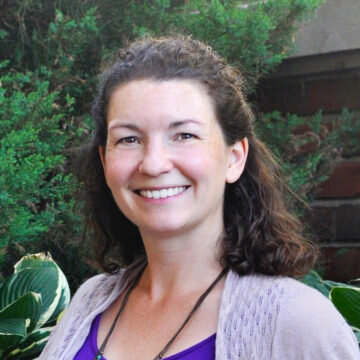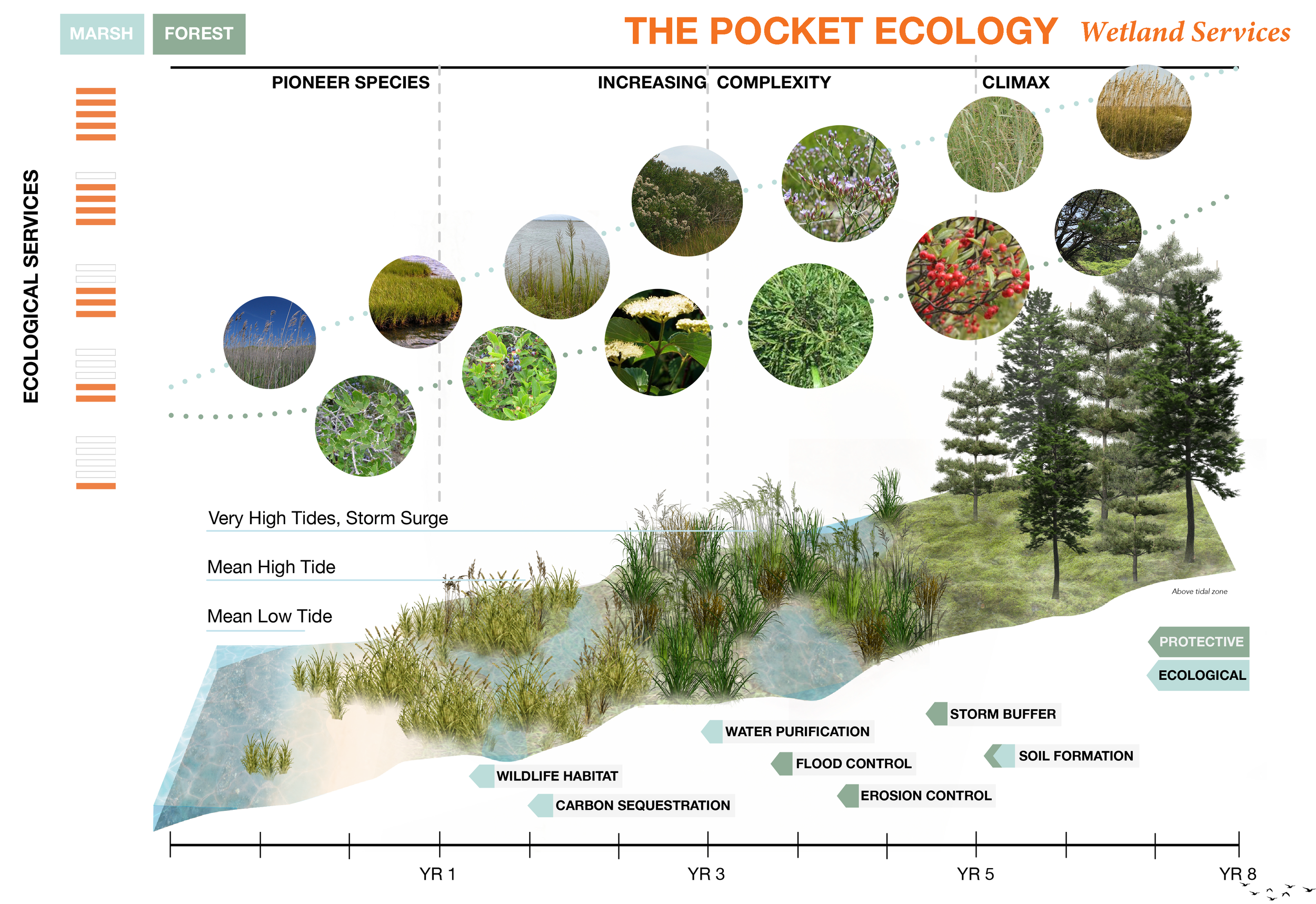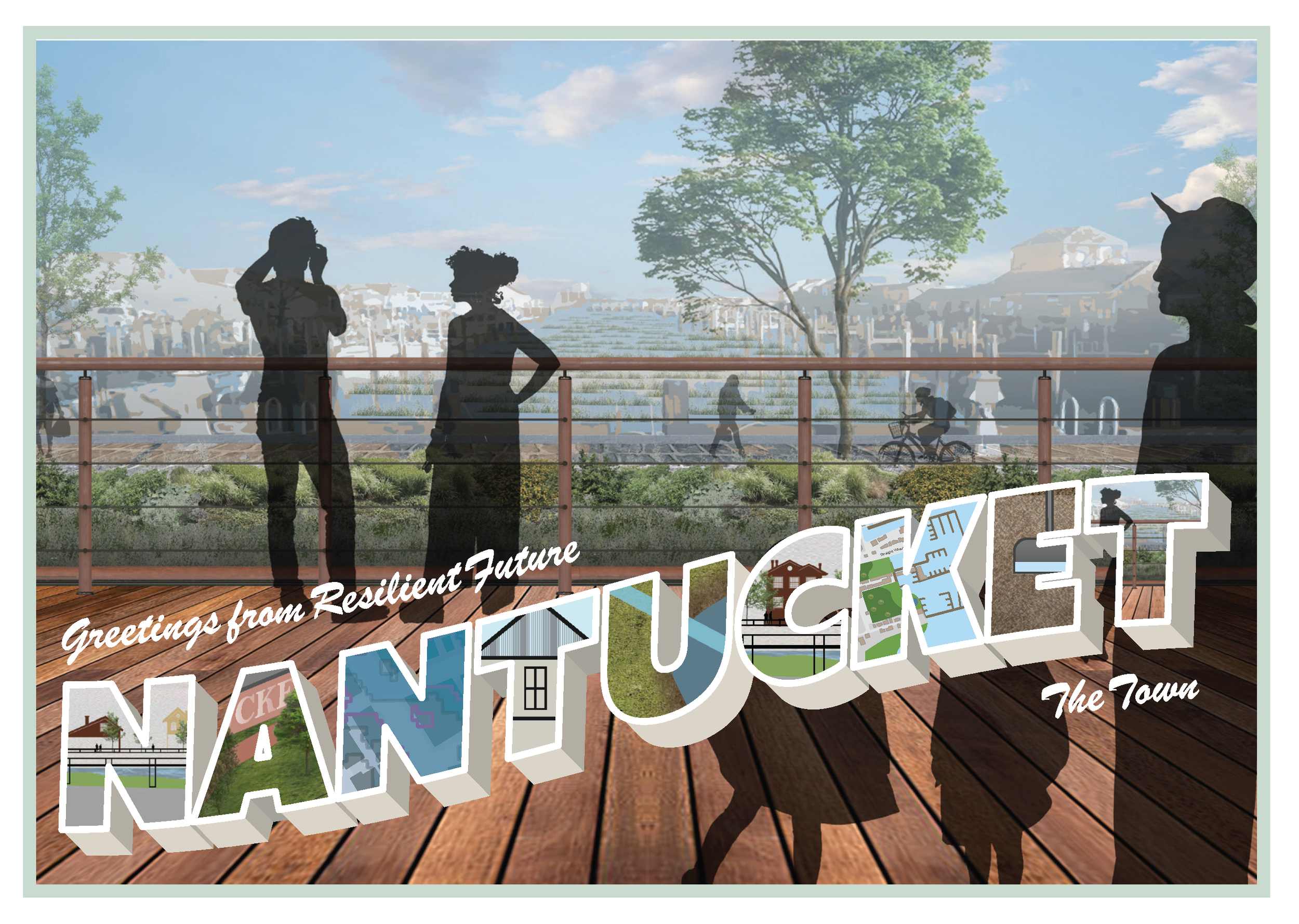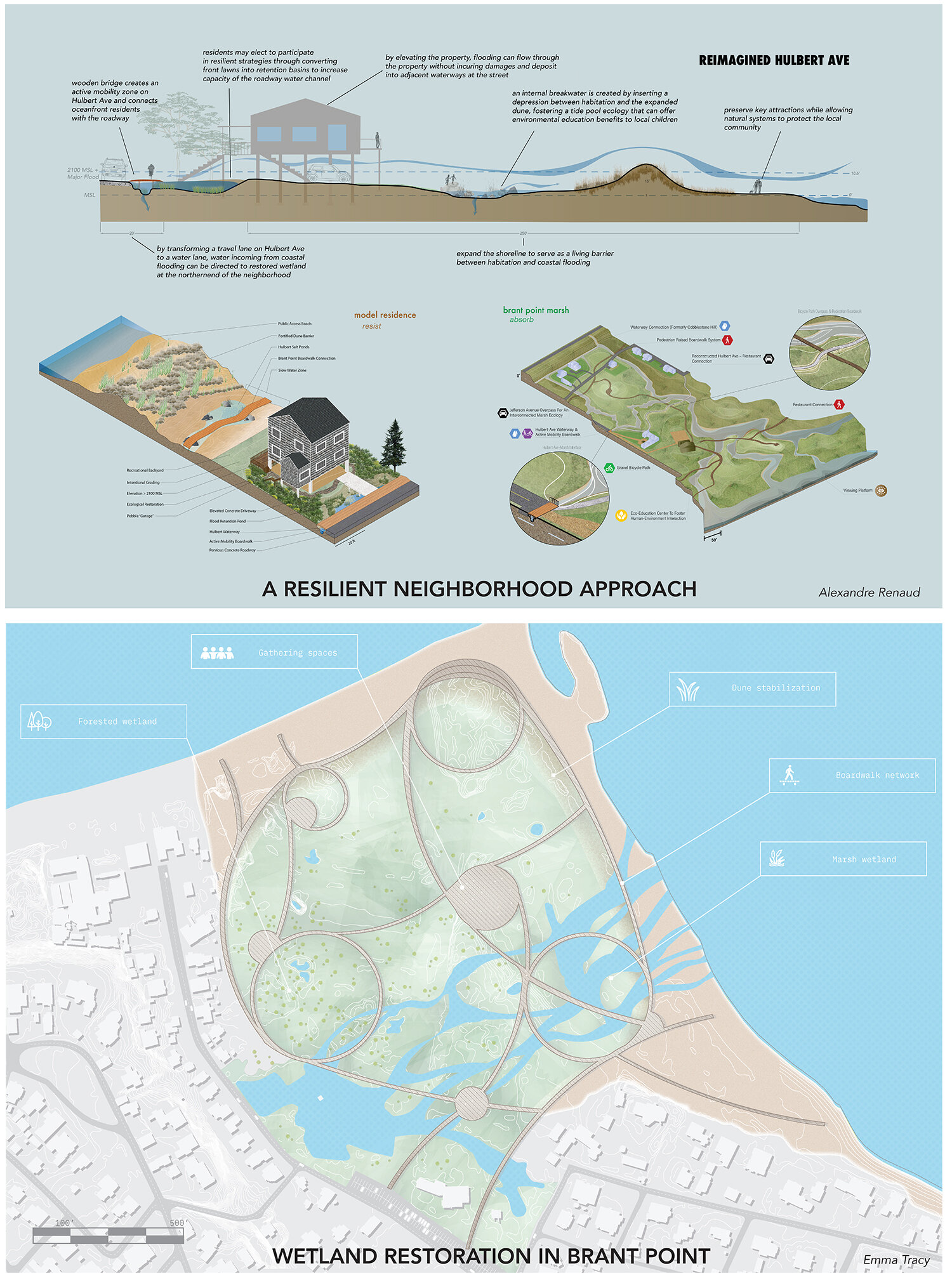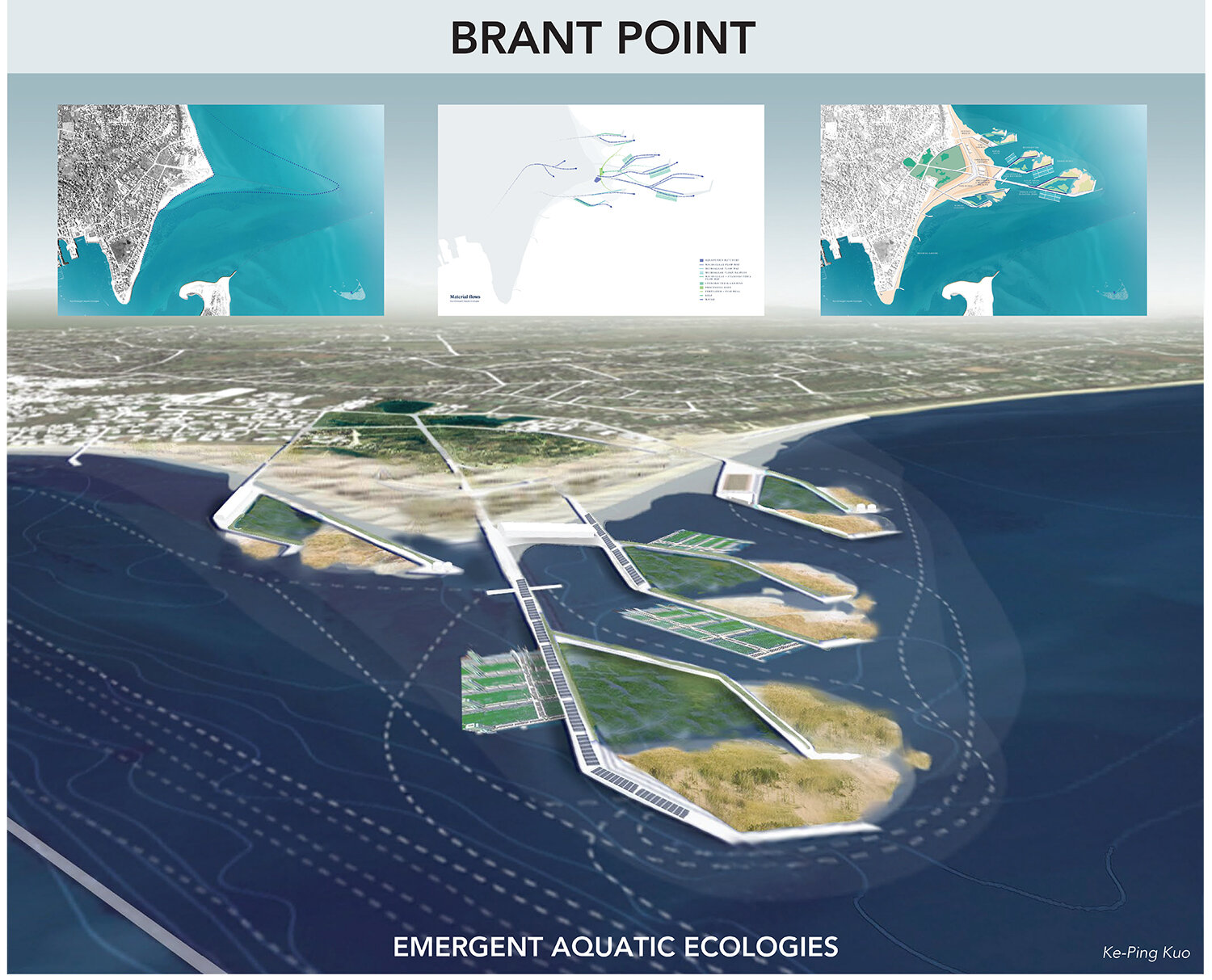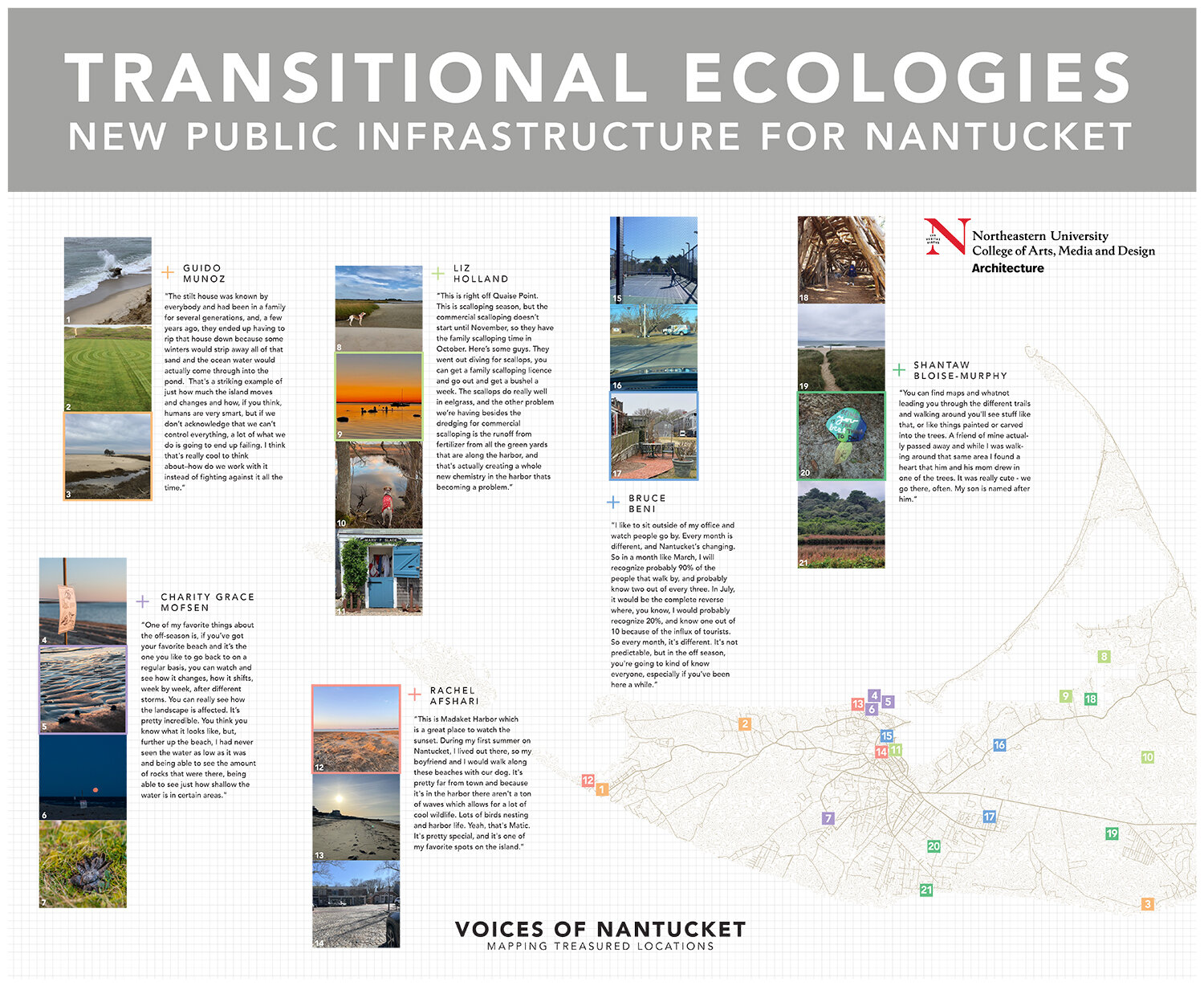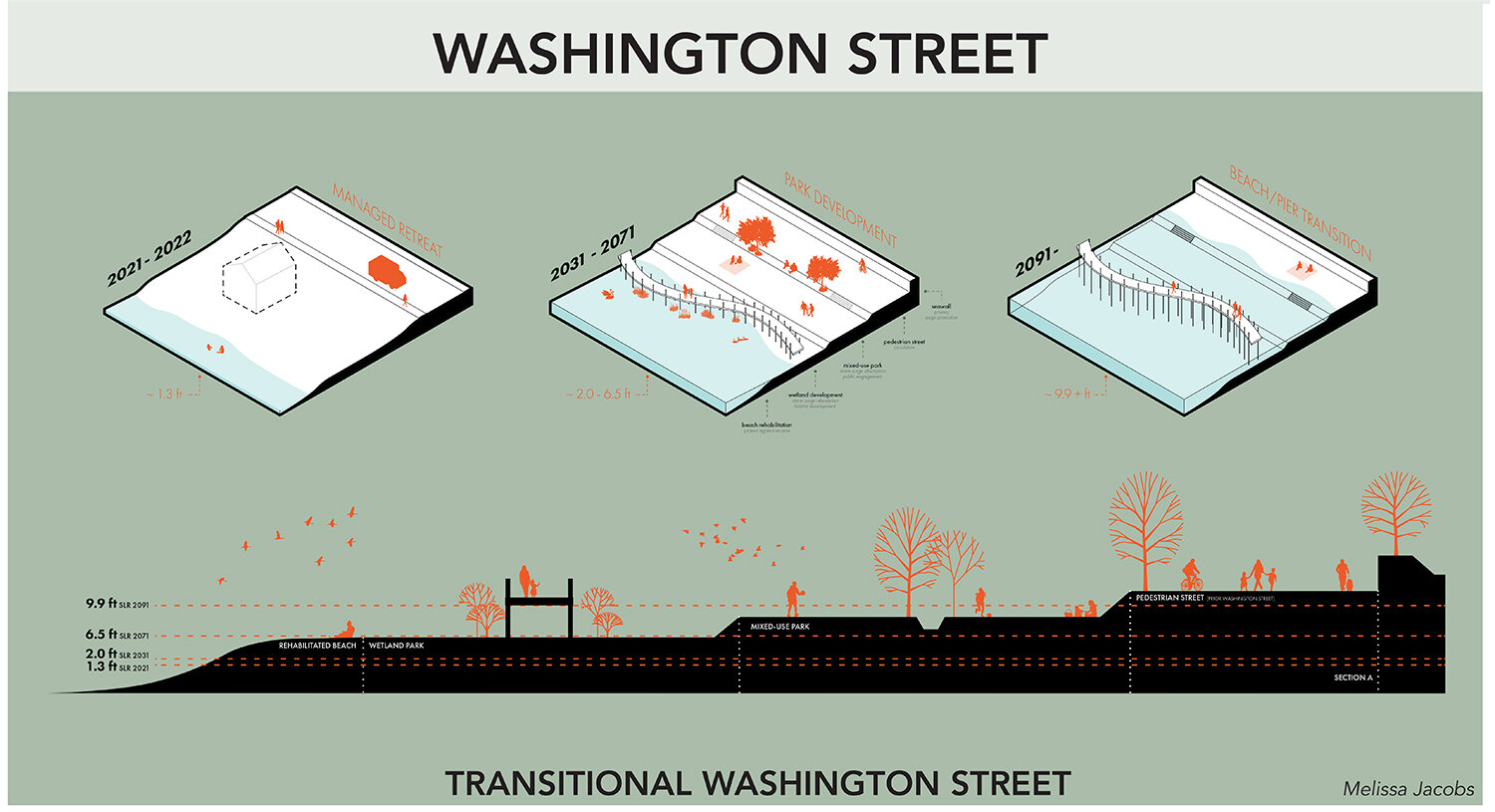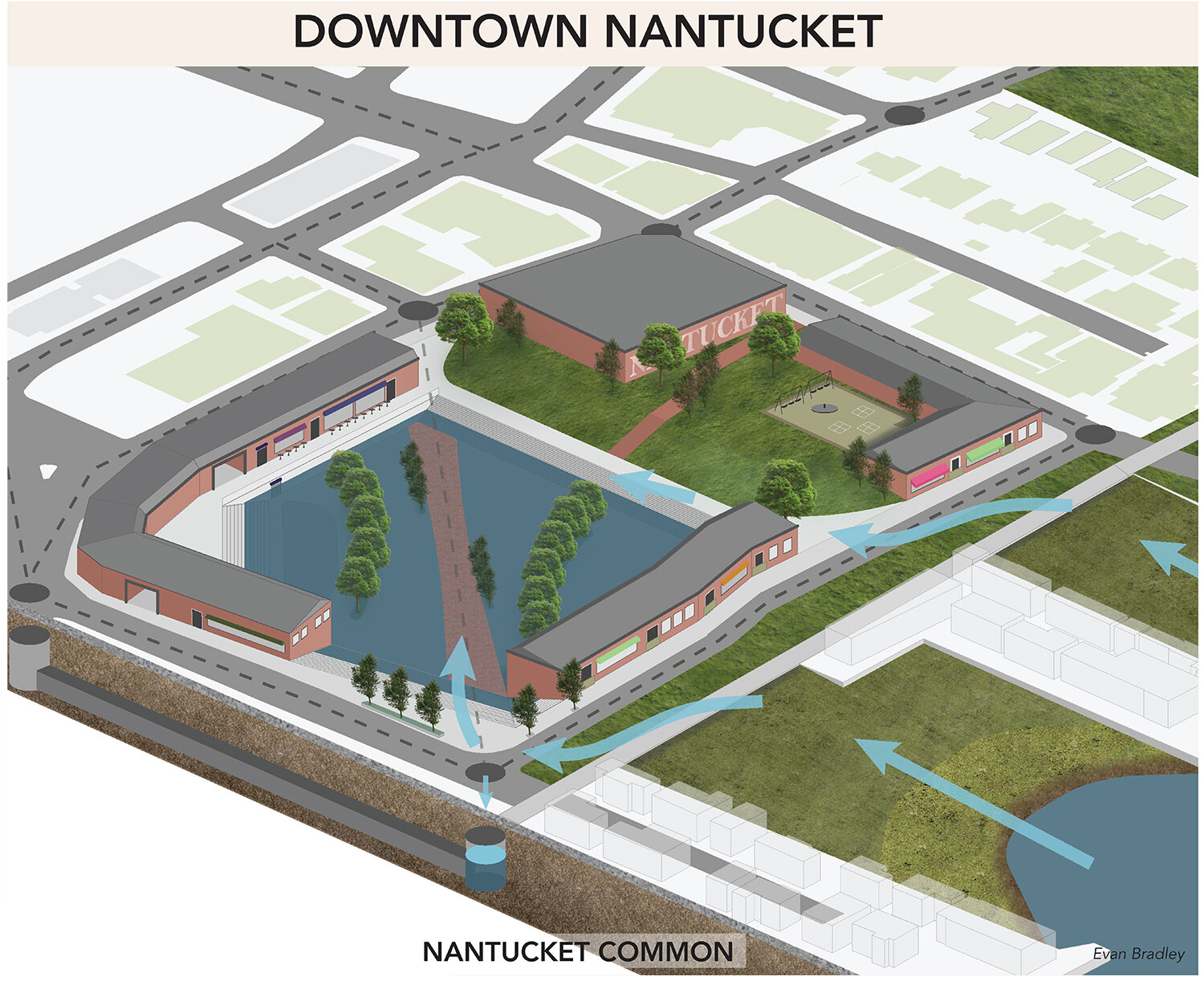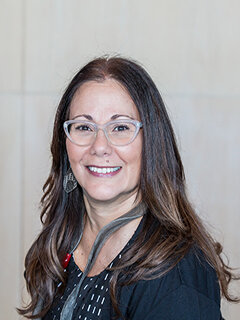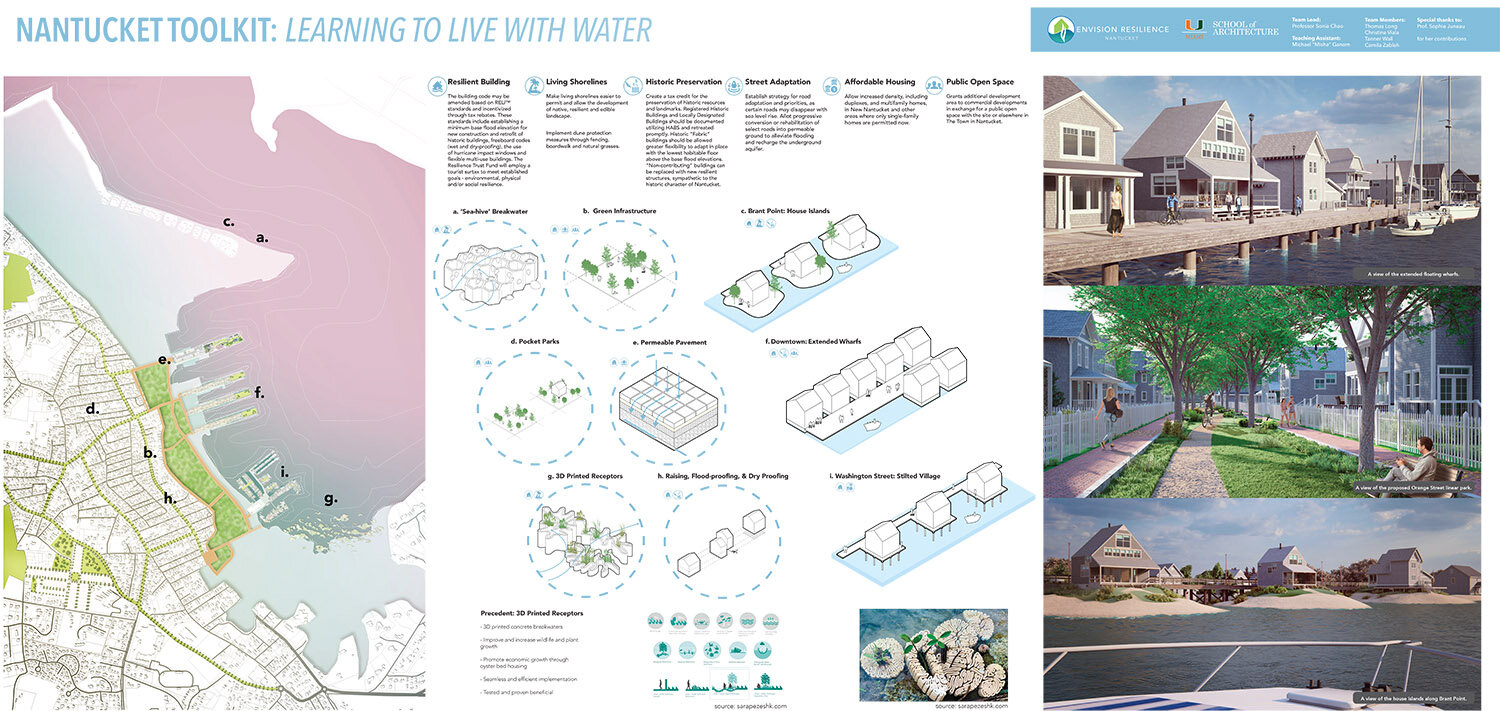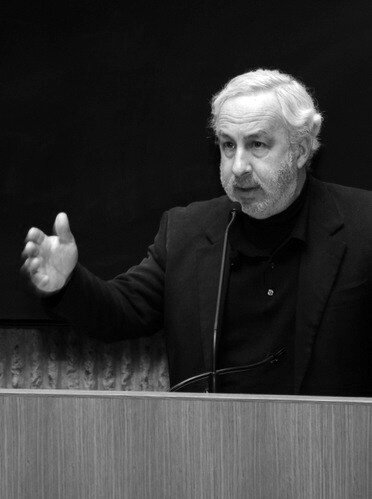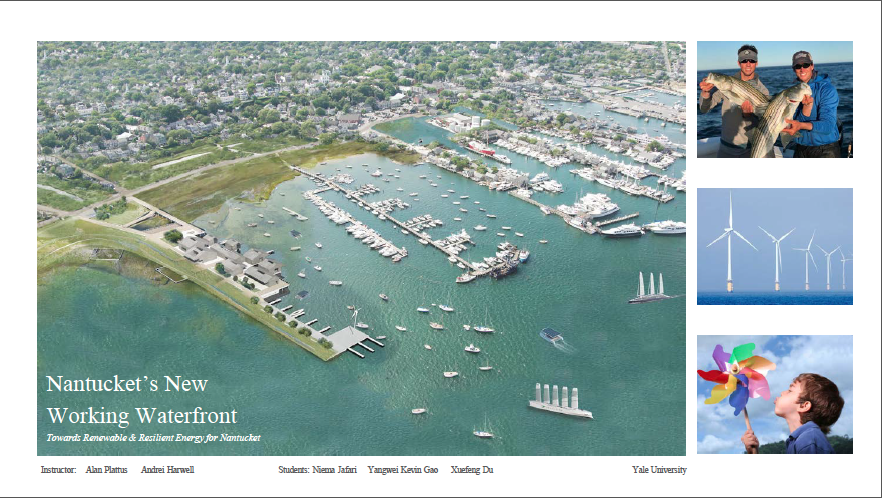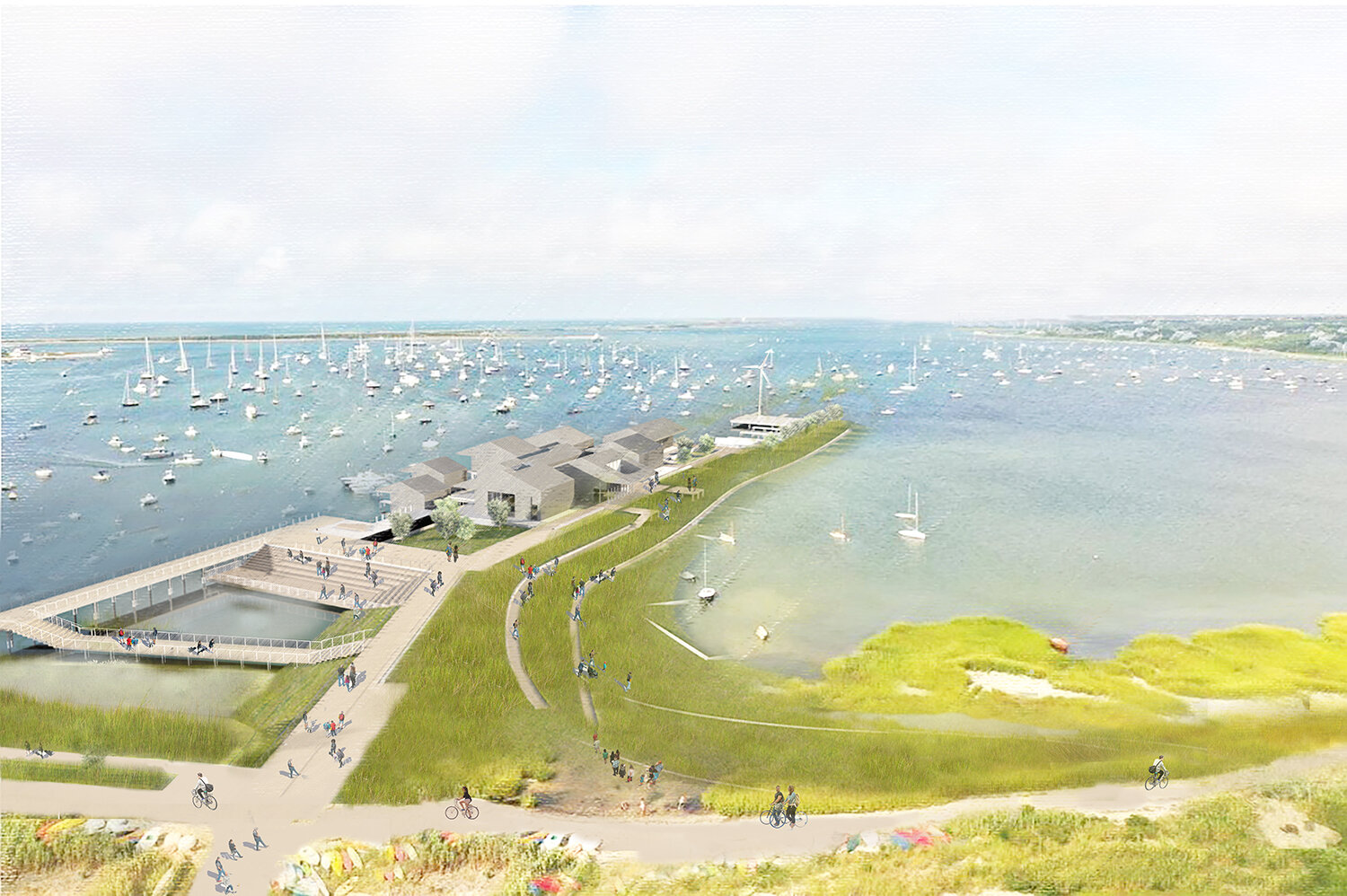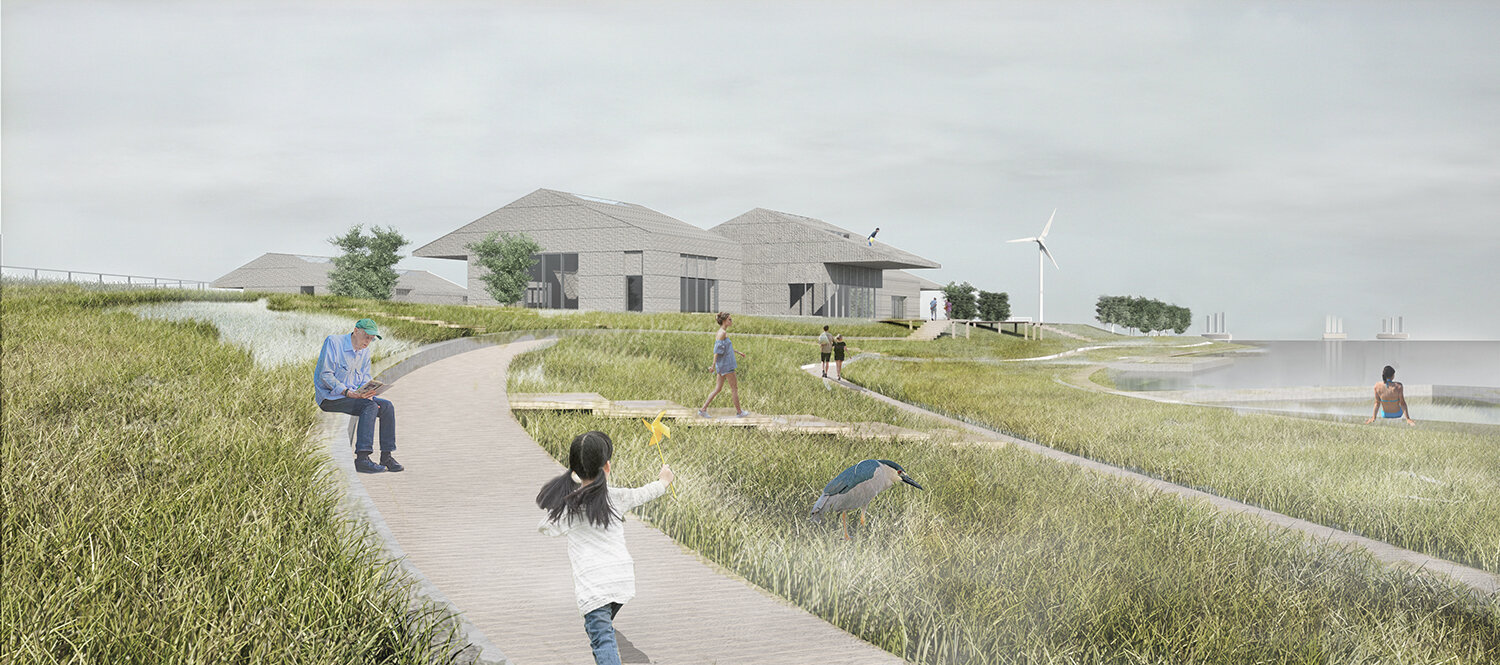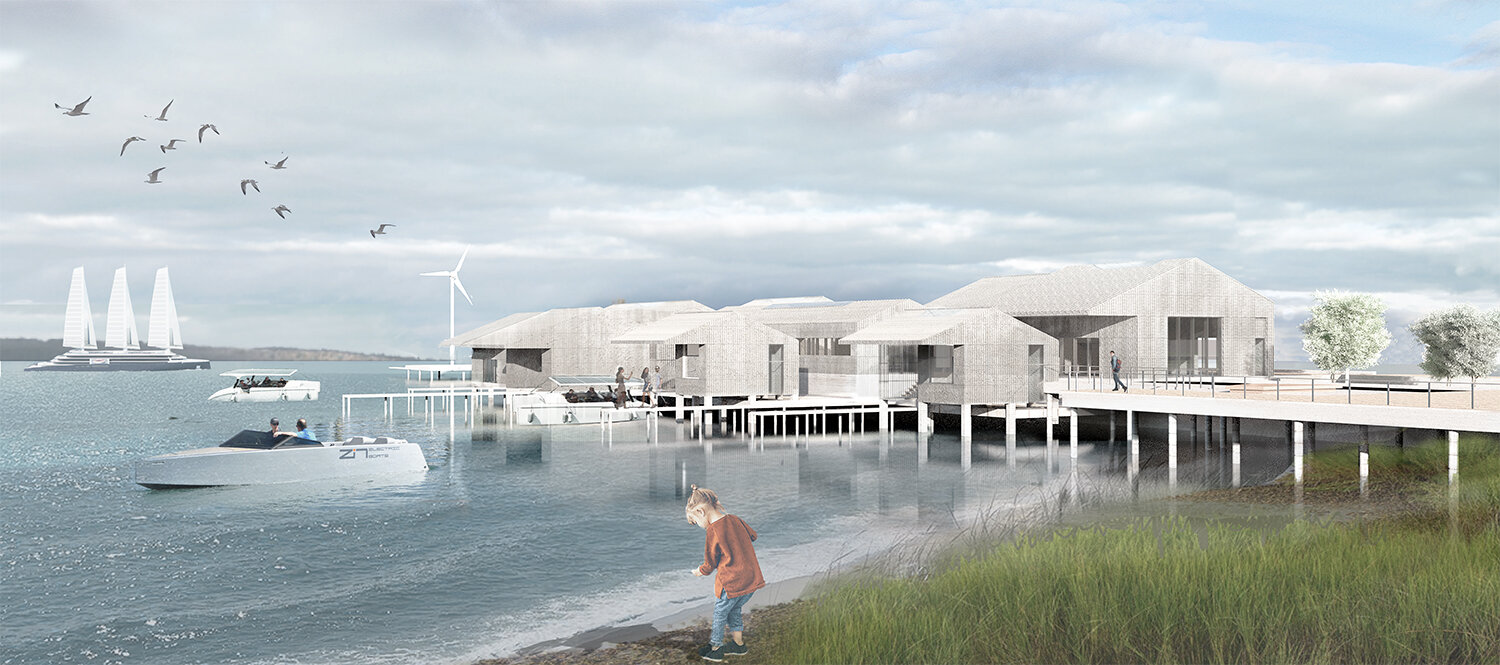
MEET THE NANTUCKET TEAMS
ReMain Nantucket has convened a group of more than 20 local and regional advisors to bring expertise in conservation, public works, real estate, architecture, historic preservation, natural resources, marine biology, fisheries, civil engineering, art, science, and transportation to participating university teams. This interdisciplinary group will continue to provide resources and insight as the teams move through the spring 2021 semester and examine the complex issue of sea level rise on Nantucket.
MEET THE NANTUCKET TEAMS
“Dwelling on the Edge”
by the University of Florida
The Spring 2021 Design 8 senior architecture studio developed a series of tactical approaches to sea level rise adaptation along Nantucket’s urban edge. On the surface, Nantucket appears locked in time, but the island community has demonstrated a strong capacity for change since its earliest days. This studio has searched for, documented and invented narratives of adaptation, built on what we have learned about Nantucket, and what our experience from Florida has brought to the project.
Jeff Carney University of Florida College of Design, Construction and Planning
Jeff Carney is an architect and urban designer working at the interface of urbanism, infrastructure, and dynamic coastal ecosystems. He is an associate professor in the School of Architecture at the University of Florida (UF) and associate director of the Florida Institute for Built Environment Resilience (FIBER). The Institute is committed to the design, planning, construction and management of resilient built environments, with strong interests in the well-being of the people and communities who inhabit them. Carney leads the Florida Resilient Cities program which works with communities across the state to connect resilience challenges with UF faculty and students through research opportunities. The inaugural city is Port St. Joe, which is still recovering from Hurricane Michael.
Students: Andrea Aristiguieta, Eoin Balara, Erika Blandon, Alex Boucher, Avery Dunavant, Celine Haddad, Ana Hernandez, Sophia Hernandez, Aimee Lawson, Gizangely Marrero, Camila Moreno, Morgan Mulholland, Christopher Rubio, Andreina Sojo, Suzanne Tielemans, Moises Villanueva
Professor: Jeffrey Carney | Teaching Assistant: Carla Brisotto
“Away… Offshore… Adrift… Shifting Landscapes, Unstable Futures”
by Harvard GSD, Department of Landscape Architecture
Chris Reed, Harvard University Graduate School of Design
Chris Reed is Founding Director of Stoss Landscape Urbanism, and both Professor in Practice of Landscape Architecture and Co-Director of the Master of Landscape Architecture in Urban Design Program at the Harvard University Graduate School of Design. He is recognized internationally as a leading voice in the transformation of landscapes and cities, and he works alternately as a researcher, strategist, teacher, designer and advisor. Reed is particularly interested in the relationships between landscape and ecology, infrastructure, social spaces and cities. His work collectively includes urban revitalization initiatives, climate resilience and adaptation efforts, speculative propositions, adaptations of infrastructure and former industrial sites, dynamic and productive landscapes, vibrant public spaces that cultivate a diversity of social uses and cultural traditions, and numerous landscape installations. His work can be found in cities as diverse as Boston, Los Angeles, St. Louis, Dallas, Detroit, Galveston, Abu Dhabi, and Dongshan, China.
Students: Fabiana Casale, Xinyi Chen, Yvonne Fang, Tong Lin, Tiangang Lyu, Gena Morgis, Caleb Negash, Tong Shen, Maria Ulloa, Kymberly Ware
Professor: Chris Reed | Teaching Assistant: Alysoun Wright
“Transitional Ecologies: New Public Infrastructures for Nantucket”
by Northeastern University College of Arts, Media and Design; Architecture
Sara Jensen Carr, The School of Architecture at Northeastern University
Sara Jensen Carr is an assistant professor at The School of Architecture at Northeastern University. Her teaching and research focuses on the connections between landscape, human health, urban ecology, and design. Her current book in progress, The Topography of Wellness: Health and the American Urban Landscape, examines landscape responses to six historical urban epidemics and the implication for current and future practice. Sara holds a Master of Architecture from Tulane University, and a Master of Landscape Architecture and PhD in Environmental Planning from University of California Berkeley, where she was the co-founding editor of the ASLA Award-winning GROUND UP Journal.
Cullen Meves, The School of Architecture at Northeastern University
Cullen Meves is a lecturer in architecture at Northeastern University School of Architecture. She is a graduate of Virginia Tech’s Master of Urban & Regional Planning program, having previously obtained two B.S. degrees in Landscape Architecture and Agriculture/Horticulture respectively from Ohio State University. She has experience in urban park, university campus, and mixed-used development landscape architectural design as well as regional land use and transportation planning. She enjoys traveling, backpacking, and hiking, both around the U.S. and abroad. She is also a self-admitted tech geek, dabbling in web design, 3D design, and coding in her free time.
Professor, Urban Ecologies and Technologies: Cullen Meves
Students: Sabrina Dengler-Coletti, Yizhou Huang, Bhavyasri Kattamudi, Daniel Nemec, Kyle Wire, Krystal Cai, Piers Ellis, Melissa Jacobs, Sophia Pinto, Emma Tracy, Emerson Campbell, Noah Wendel
Professor, Designed Urban Ecologies: Sara Carr
Students: Alex Renaud, Mia Kania, Emma Tracy, Jack Dorland, Evan Bradley, Ke-Ping (Cammy) Kuo, Cassandra Lanson, Jasmin Dickinson, Emerson Campbell
“Nantucket Toolkit: Learning to Live with Water”
by the University of Miami
The University of Miami team, through their course: Envisioning a Resilient Nantucket (3 credit seminar elective), is recommending a holistic building block approach to tackling the increasing climate stressors and shocks Nantucket will face over the coming decades. Rather than a stand-alone project, the team suggests a master plan, composed of complementary and interconnected elements, layered over time, can best serve the residents of the town, while catalyzing change to each of the three study areas. Such a plan connects strategies that in turn are part of a toolkit of tactics and policies aimed at ensuring Nantucket’s adjustment to climate change. Instead of fighting the rising seas the overarching theme of the team is one of “living with water.”
Sonia Raquel Chao, University of Miami School of Architecture
Sonia Chao writes and teaches in the area of sustainable architecture and urbanism, resilient design, and historic preservation in the subtropics. Her scholarship explores the intersection between historic preservation, historic places and resilient design. Chao’s current research, funded by the National Science Foundation (NSF), studies the connections between a city’s built and social layers. The aim is to produce new meta-models, through a human-centered framework, to inform anticipatory guidelines for resilient urban and community design of coastal cities. In the aftermath of Hurricane Andrew (1992), Chao became the founding director for the University of Miami School of Architecture’s Center for Urban & Community Design and Chao has served as its director since 2006. Chao also helped create the new interdisciplinary Master of Professional Science in Urban Sustainability & Resilience program, which she co-directs, and that launched in the fall of 2020.
Students: Camila Zablah, Paula Christina Viala, Thomas Long, Tanner Wall
Professor: Sonia Chao, Research Associate Professor, School of Architecture and Co-director, Master of ProfessionalScience in Urban Sustainability and Resilience program
Graduate Assistant: Michael Ganom
“Nantucket and Coastal New England: History, Threat and Adaptation”
by the Yale School of Architecture
The Yale team is composed of Master of Architecture program students in an advanced design studio. The research began with an “Atlas of Change and adaptation” and pilot projects are multiscalar extended networks of culture, economy, migration, settlement, mobility, ecology and weather. The team describes their process as a spatial framework of adaptation in which they have tried to emphasize that adaptation over time is the project with one of the possible outcomes being some degree of resilience. The concepts that come from this design studio include an insistence in the multiscalar nature of adaptation, the necessity of a multifunctional approach to adaptation (no single purpose engineering solutions) and an experimental approach with Nantucket as a laboratory.
Alan Plattus, Yale School of Architecture
Alan Plattus began teaching at Yale in 1986 after serving on the faculty of Princeton University for seven years. He is the current director of the School’s Ph.D. program and the Yale Urban Design Workshop and Center for Urban Design Research (YUDW), which he founded in 1992 and which undertakes research and design studies for communities throughout Connecticut and the metropolitan region. Current YUDW projects include planning for a Heritage Park along the Thames River between New London and Groton, Connecticut, and resiliency planning for Bridgeport and the Connecticut coast funded by HUD’s Rebuild by Design program.
Andrei Harwell, Yale School of Architecture
Andrei Harwell is an architect, urban designer and planner. Over the last fifteen years he has been involved in the design and management of a wide range of award winning projects—from the design of individual buildings and public spaces to neighborhood and downtown plans. Since 2006, he has managed the Yale Urban Design Workshop and Center for Design Research in New Haven. Before joining the Yale faculty, Mr. Harwell practiced in the New York office of Hardy Holzman Pfeiffer Associates, where he worked on major cultural and institutional projects, including the Hippodrome Theatre at the France-Merrick Performing Arts Center, the Theatre for a New Audience, and the Packer Collegiate Institute. His design work and research have been published in the New York Times, Architectural Record, Building Design, mu-dot and Connecticut Magazine. He received a BA in Architecture from Carnegie Mellon University and a Masters in Architecture from Yale University.
Students: Rebecca Commissaris, Xuefeng Du, Anjelica Gallegos, Kevin Gao, Gabriel Guiterrez Huerta, Niema Jafari, Mari Kroin, Elise Barker Limon, Daoru Wang, Robin Yang
Professors: Alan Plattus and Andrei Harwell


